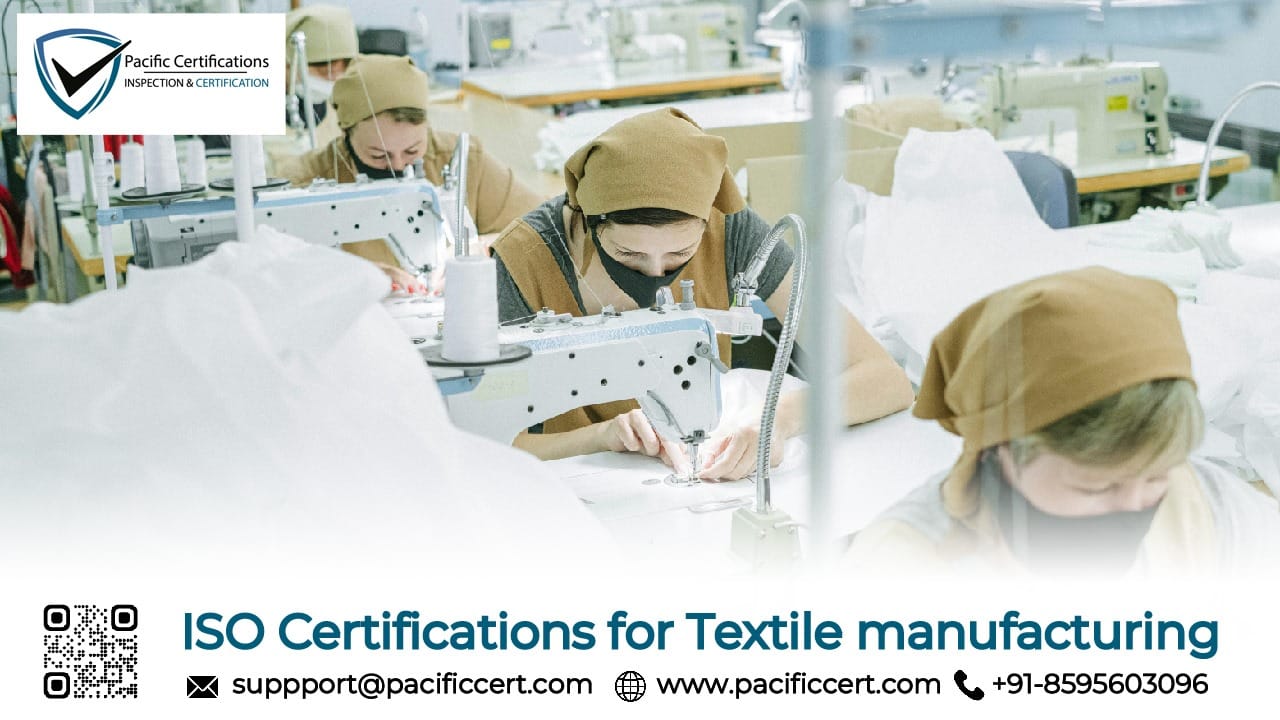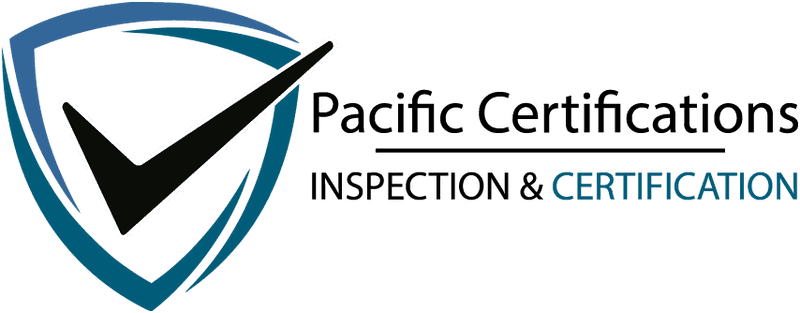ISO Certifications for Textile Manufacturing Businesses, Requirements and Benefits

Introduction
Textile manufacturing remains one of the most globally competitive and sustainability-driven industries. Whether operating spinning mills, weaving facilities, dyeing and finishing plants, garment & apparel units, or technical textile facilities, producers today face a convergence of quality expectations, environmental regulations, labor compliance scrutiny, and trade-based sustainability criteria.
Global buyers increasingly insist on demonstrable, certifiable systems that guarantee consistent product quality, responsible chemical and water management, fair and safe working conditions, traceable supply chains, and data-secure ERP-enabled operations.
ISO certifications support textile manufacturers in building structured governance systems, reducing production variability, strengthening pollution and effluent controls, ensuring workplace health & safety excellence, and positioning themselves as reliable, ethical, and globally acceptable suppliers in a rapidly evolving marketplace.
In a textile marketplace dominated by quality benchmarks, ethical sourcing, and sustainable production, compliance is not paperwork; it is your passport to global trade.
Looking to get ISO certification for your textile manufacturing business? Contact us at [email protected].
Quick Summary
Textile manufacturers pursue ISO certifications to ensure consistent production quality, strengthen environmental and chemical management controls, demonstrate ethical workforce practices, increase export eligibility, and mitigate operational risks. Key standards include ISO 9001, ISO 14001,ISO 45001 , ISO 50001, ISO/IEC 27001(for ERP and supply chain data), and sustainability-linked frameworks such as ISO 14064 and ISO 37301.
Applicable ISO Standards for Textile Manufacturing
Many ISO standards apply to textile manufacturing, focusing on areas such as environmental management, product safety, quality control and occupational safety. Below are some of the most relevant ISO certifications for the textile industry:
ISO Standard | Description | Relevance |
|---|---|---|
ISO 9001:2015 | Quality Management System | Ensures consistent product quality, defect reduction, and streamlined production |
ISO 14001:2015 | Environmental Management System | Controls chemical discharge, wastewater treatment, dyeing emissions, and solid waste |
ISO 45001:2018 | Occupational Health & Safety | Protects factory workers from machinery hazards, chemicals, and ergonomic risks |
ISO 50001:2018 | Energy Management | Optimises energy consumption in boilers, dyeing, HVAC, and machinery |
ISO/IEC 27001:2022 | Information Security Management | Secures ERP, production data, order records, supplier systems, and customer IP |
ISO 14064 | Greenhouse Gas Management | Supports decarbonization reporting and climate-aligned supply chains |
ISO 37301 | Compliance Management | Strengthens legal and regulatory textile compliance governance |
ISO 9001: Quality Management System (QMS)
ISO 9001 ensures that a textile manufacturer consistently delivers high-quality products that meet customer expectations. It focuses on process efficiency, customer satisfaction, and continuous improvement in operations.
ISO 14001: Environmental Management System (EMS)
Textile production involves processes that can have adverse environmental impacts, such as water pollution and energy consumption. ISO 14001 helps companies implement sustainable practices, control emissions, reduce waste, and ensure environmental compliance.
ISO 45001: Occupational Health and Safety (OH&S)
This certification focuses on workplace safety, ensuring that textile manufacturers provide a safe working environment for employees. With the physical demands of textile production, ISO 45001 helps reduce workplace accidents and improve employee well-being.
ISO 50001: Energy Management System
Energy-intensive processes, such as dyeing and fabric processing, are common in textile manufacturing. ISO 50001 provides a framework for optimizing energy use, reducing energy costs, and minimizing environmental impact.
ISO 26000: Social Responsibility
Though not a certifiable standard, ISO 26000 provides guidance on how textile companies can operate in a socially responsible way, balancing profit with environmental stewardship and social welfare.
ISO 17025: Laboratory Testing and Calibration
Textile companies often conduct product testing to ensure color fastness, durability, and other properties. ISO 17025 certifies the competence of testing and calibration laboratories, ensuring reliable results for quality assurance.
Click here to find out more applicable standards to your industry
Why ISO Certifications Matter for Textile Manufacturers?
The textile supply chain faces continuous scrutiny from international buyers, regulatory authorities, and sustainability-driven consumers. ISO certifications empower textile factories to establish documented production controls, chemical handling protocols, machine safety frameworks, energy conservation mechanisms, and resource-efficiency practices. This fosters improved product uniformity, reduced rework and wastage, safer operational environments, and enhanced global procurement acceptance. Suppliers in Europe, the United States, and the Middle East increasingly rely on certified textile partners due to traceability and compliance requirements.
What are the requirements of ISO Certifications for Textile manufacturing?
Each ISO standard has specific requirements, here are the key requirements for relevant ISO standards:
General requirements:
- Understand organizational scope covering production units, dyeing operations, supply chain flows, effluent treatment facilities, warehouses, and workforce areas with clear leadership accountability.
- Develop documented quality, safety, and environmental policies addressing chemicals, machinery safety, effluents, energy use, and worker well-being.
- Conduct risk and environmental impact assessments covering hazardous chemicals, dust exposure, fire safety, wastewater, and occupational hazards.
- Implement operational controls including SOP-driven dyeing, cutting, stitching, finishing, and packaging procedures.
- Maintain chemical management, MSDS documentation, effluent control records, and calibration logs for production machinery.
- Establish monitoring systems for production defects, water and energy usage, safety incidents, and compliance obligations.
- Perform internal audits, management reviews, and workforce training programs to reinforce continual improvement.
Tip: Begin with a gap assessment focusing on quality consistency, chemical usage, effluent processes, energy consumption, and worker safety controls, then prioritise procedural discipline and documentation maturity.
What are the benefits of ISO Certifications for Textile manufacturing?
Implementing ISO standards offers a wide range of benefits, including improved efficiency and market access. Below are some of the key advantages:
- Demonstrated quality consistency and reduced defect rates improve buyer satisfaction and global sourcing approvals.
- Optimized resource use and waste reduction lower dyeing costs, energy consumption, and chemical inefficiencies.
- Stronger worker safety controls reduce accidents, enhance compliance, and improve labour welfare credibility.
- Enhanced environmental stewardship supports wastewater and pollution reduction, boosting sustainability credentials.
- Superior documentation, traceability, and supplier confidence accelerate export acceptance and brand value.
- Better governance reduces risk exposure, non-compliance penalties, and audit failures from international clients.
The global textile industry is projected to reach over USD 1.4 trillion by 2030, driven by the expanding apparel, technical textiles, medical fabrics, and eco-friendly fibres market. Sustainability remains a structural demand driver, with more than 52 percent of global textile buyers prioritizing environmentally certified suppliers and over 40 percent of European and American procurement policies now including formal compliance screening. Water and chemical pressures are intensifying, especially as dyeing and finishing units face stringent zero-liquid-discharge and carbon-reduction mandates, pushing factories to adopt ISO 14001 and ISO 50001.
The adoption of digital supply chain systems and ERP platforms also increases cybersecurity obligations, and ISO/IEC 27001 certifications are expanding rapidly across global textile hubs including India, Bangladesh, Turkey, and Vietnam. ESG-driven procurement, coupled with sustainability reporting frameworks, indicates that certified textile manufacturers observe higher export conversion rates, reduced compliance risk, and stronger buyer retention.
How Pacific Certifications Can Help
Pacific Certifications supports textile manufacturers through accredited, impartial certification audits to verify compliance with ISO 9001, ISO 14001, ISO 45001, ISO 50001, ISO/IEC 27001, and related standards. Certification strengthens supplier credibility, export competitiveness, and audit readiness for global textile buyers. Our audit approach focuses on production system maturity, environmental controls, workplace safety, and continuous improvement mechanisms within textile mills and garment facilities.
Our support includes:
- Accredited Stage 1 and Stage 2 certification audits
- Surveillance and recertification assessments for ongoing compliance
- Objective evaluation of chemical management, environmental controls, machine safety, and quality systems
- Certification recognized for global procurement and sourcing programs
- Transparent audit methodology aligned with international best practices
If you need support with ISO certification for your Textile manufacturing business, contact us at [email protected] or +91-8595603096.
FAQs: ISO Certifications for Textile manufacturing
What is the importance of ISO certifications for textile manufacturing?
ISO certifications ensure that textile manufacturers follow best practices for quality, safety, and sustainability, improving market credibility and operational efficiency.
How long does it take to get ISO certification for textile companies?
The certification process typically takes 3 to 6 months, depending on the size of the company and its readiness for the audit.
What is the difference between ISO 9001 and ISO 14001 in textile manufacturing?
ISO 9001 focuses on quality management, while ISO 14001 deals with environmental management. Both are important for textile companies to maintain high product quality and sustainability.
Do textile companies need ISO 45001 certification?
Yes, ISO 45001 is essential for ensuring workplace safety, particularly in labor-intensive industries like textile manufacturing.
Can Pacific Certifications provide consultancy services for ISO standards?
No, Pacific Certifications only provides auditing and certification services. We do not offer consultancy or implementation services.
How can I get started with ISO certification for my textile business?
You can start by contacting Pacific Certifications at [email protected] or +91-8595603096 to schedule a pre-audit assessment.
Author: Pooja
Read More at: Blogs by Pacific Certifications

